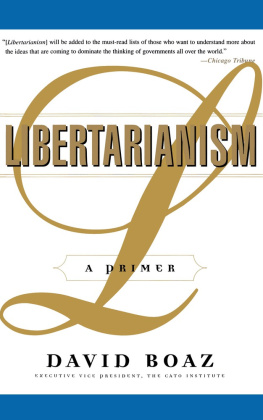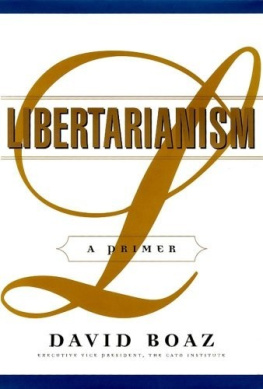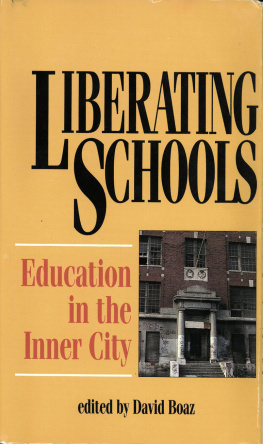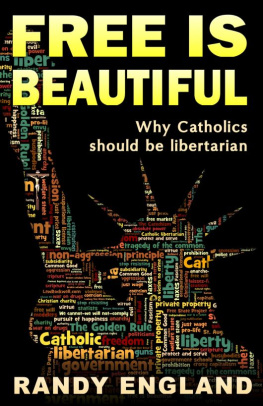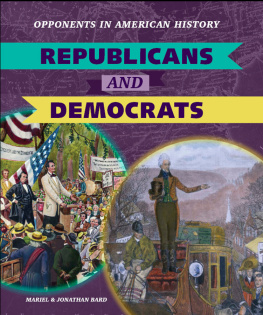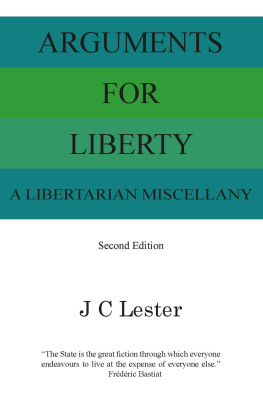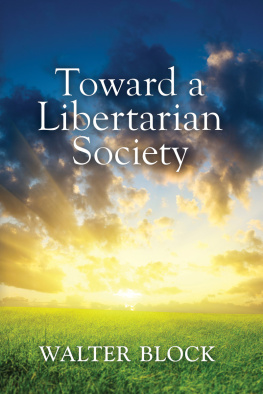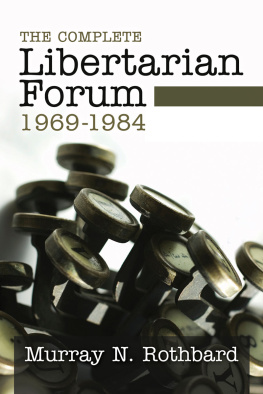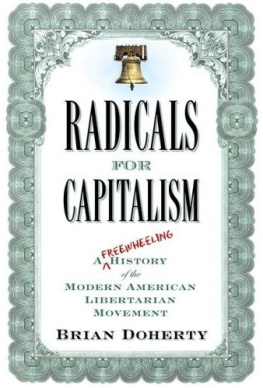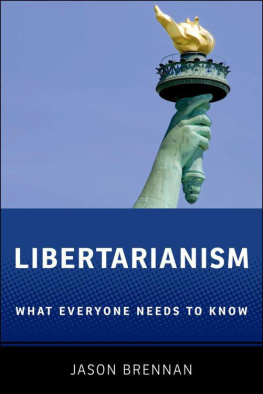We hope you enjoyed reading this Simon & Schuster eBook.
Join our mailing list and get updates on new releases, deals, bonus content and other great books from Simon & Schuster.
C LICK H ERE T O S IGN U P
or visit us online to sign up at
eBookNews.SimonandSchuster.com
Thank you for downloading this Simon & Schuster eBook.
Join our mailing list and get updates on new releases, deals, bonus content and other great books from Simon & Schuster.
C LICK H ERE T O S IGN U P
or visit us online to sign up at
eBookNews.SimonandSchuster.com

Simon & Schuster Paperbacks
1230 Avenue of the Americas
New York, NY 10020
www.SimonandSchuster.com
Copyright 1997 by David Boaz
All rights reserved, including the right to reproduce this book or portions thereof in any form whatsoever. For information address Simon & Schuster Subsidiary Rights Department, 1230 Avenue of the Americas, New York, NY 10020.
First Simon & Schuster trade paperback edition February 2015
SIMON & SCHUSTER and colophon are registered trademarks of Simon & Schuster, Inc.
The Simon & Schuster Speakers Bureau can bring authors to your live event. For more information or to book an event contact the Simon & Schuster Speakers Bureau at 1-866-248-3049 or visit our website at www.simonspeakers.com.
Interior design by Claudia Martinez
Cover design by Michael Accordino
Cover photograph ImageZoo / Getty Images
Library of Congress Cataloging-in-Publication Data
The Libertarian reader: classic and contemporary writings from Lao-tzu to Milton Friedman / [compiled by] David Boaz.
p.cm.
Includes bibliographical references (p.).
1.Libertarianism.I.Boaz, David, 1953.
JC585.L38981997
320.51'2dc21
9648122
CIP
ISBN 978-1-4767-5289-1
ISBN 978-1-4767-5292-1 (ebook)
Permission and copyright information regarding individual selections is given in the section, p. 591ff.
Contents
Introduction
The question of the relationship of individuals to one another and to the state has been debated for as long as we have records of human debates, especially in the Western world. The specific perspective on that question known as libertarianism took many centuries to develop, and its intellectual evolution was often intertwined with political struggles. Today, as the brutality, indignity, and inefficacy of coercion become increasingly apparent, more and more people around the world are embracing the philosophy of individual rights, civil society, and free markets.
In 2013, as endless wars, mounting debt, and revelations about the surveillance state dominated political discussion, a Washington Post headline declared Libertarianism is hot. The following year Financial Times columnist Edward Luce wrote, If there is a new spirit in Americas rising climate of anti-politics, it is libertarian.
Libertarian ideas have been building over a long period, perhaps since the stumbles of the New DealGreat Society paradigm in the 1970s. In his 1996 presidential address to the American Sociological Association, Amitai Etzioni noted that libertarianisms influence has been rising in social science, law, philosophy, and society over the last two decades. A few years later Colin Bird of the University of Virginia wrote, The prestige of classical liberal and libertarian ideas has been higher than at any time since the end of the nineteenth century. Moreover, it is libertarian, not communitarian, ideas that have had a more direct impact on the politics of the Western countries over the past twenty-five years.
Not everyone likes this way of thinking, of course. New York Times columnist David Brooks deplored in 2013 the distinct strands of libertarianism that are blossoming in this fragmenting age: the deep suspicion of authority, the strong belief that hierarchies and organizations are suspect, the fervent devotion to transparency, the assumption that individual preference should be supreme. Scholars such as Garry Wills, Charles Taylor, Lawrence Lessig, Cass Sunstein, Ellen Willis, Benjamin Barber, and Michael Sandel have written books critical of libertarian ideas.
Libertarian political sentiments are strong, especially among younger Americans. There has been a remarkable efflorescence of libertarian scholarship and policy analysis. The goal of this reader is to offer in one place a necessarily brief introduction to the richness of the libertarian tradition, from the days of John Locke and Adam Smith to F. A. Hayek, Ayn Rand, and Milton Friedman.
THE ROOTS OF LIBERTARIANISM
Although libertarian ideas are evident in the writings of the Chinese philosopher Lao-tzu in the sixth century BCE, the main thread of libertarianism goes back to the Jewish and Greek idea of a higher law, a law by which everyone, even the ruler, could be judged. The simple idea that the will of the ruler was not the ultimate source of authority helped lay the groundwork for a pluralist society, the flowering of individualism, and eventually the scientific and economic miracles of Western civilization.
Libertarianism developed in a civilization that was, by world standards, profoundly decentralized. The many political jurisdictions in a common European culture gave individuals some opportunity to move from repressive to less repressive regimes and thus gave rulers incentives to bargain with their subjects, notably by granting them liberties and immunities. The existence of an independent church played a major role in limiting and dividing power, as did the emergence of chartered towns in the Middle Ages.
A consistent libertarian doctrine began to emerge in the seventeenth century in response to the royal absolutism of the Bourbons in France, the Stuarts in England, and the Habsburgs in the Netherlands. John Miltons Areopagitica was an eloquent defense of religious freedom and a free press. The Levellers in the 1640s, led especially by the popular hero John Lilburne, began to put forth a program of religious toleration, low taxes, abolition of monopolies, peace, and freedom of the press, all based on a foundation of self-ownership and natural rights. That is the first recognizably libertarian (or liberal) political platform, though neither term was used at the time.
A generation later, John Locke set forth the philosophical justification for liberty, property, and a government based on consent in his Second Treatise of Government, published in 1690. His ideas have been an essential foundation for libertarian thought ever since. They also constitute the fundamental argument underlying modern democratic governments, though modern governments have strayed far from Lockes strict definition of the purpose of government: to protect life, liberty, and estate (all of which constituted property).
Lockes ideas were echoed and developed by John Trenchard and Thomas Gordons Catos Letters in the 1730s, by the revolutionary pamphleteer Thomas Paine, and by Thomas Jefferson in the Declaration of Independence. With the addition of the economic theory of spontaneous order and free marketsdeveloped by the Spanish School of Salamanca, the French Physiocrats, and the Scottish Enlightenment thinkers, especially Adam Smithlibertarianism was essentially complete. It combined a normative theory of justice, imprescriptible rights, with a positive theory of social analysis, the self-regulating order.
To say the theory was essentially complete, of course, is not to suggest that liberalism or libertarianism is a closed system. Libertarian ideas have been continually developed and debated: David Humes analysis of the circumstances that require us to develop a system of property rights; Mary Wollstonecrafts demonstration that the rights of men are also the rights of women; Alexis de Tocquevilles penetrating analysis of liberty and democracy; the abolitionists view of slavery as man-stealing; Wilhelm von Humboldts and John Stuart Mills emphasis on the individuals need to develop his own character; Herbert Spencers consistent application of the law of equal freedom to every area of state action; the discovery (or rediscovery) of the marginal theory of value by the economists Carl Menger, W. Stanley Jevons, and Leon Walras; the devastating critique of socialism by Ludwig von Mises; F. A. Hayeks lifelong investigation of spontaneous order; Ayn Rands radical moral defense of individualism against collectivism; Murray Rothbards argument that the coercive state is not needed even to supply defense and justice; Robert Nozicks examination of what kind of state can be justified if individuals have rights; the countless studies of the failure of government intervention in the free market by Milton Friedman and his colleagues at the University of Chicago; and much more.
Next page

